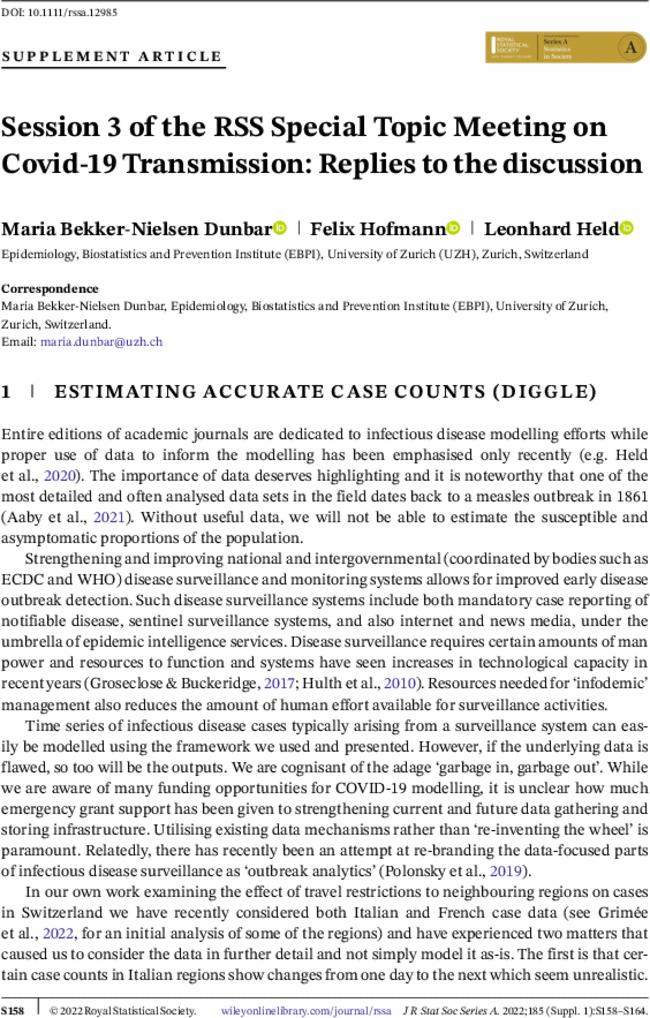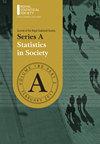新冠病毒传播RSS专题会议第三部分:讨论答复
IF 1.5
3区 数学
Q2 SOCIAL SCIENCES, MATHEMATICAL METHODS
Journal of the Royal Statistical Society Series A-Statistics in Society
Pub Date : 2022-12-11
DOI:10.1111/rssa.12985
引用次数: 0
摘要
本文章由计算机程序翻译,如有差异,请以英文原文为准。

Session 3 of the RSS Special Topic Meeting on Covid-19 Transmission: Replies to the discussion
Entire editions of academic journals are dedicated to infectious disease modelling efforts while proper use of data to inform the modelling has been emphasised only recently (e.g. Held et al., 2020). The importance of data deserves highlighting and it is noteworthy that one of the most detailed and often analysed data sets in the field dates back to a measles outbreak in 1861 (Aaby et al., 2021). Without useful data, we will not be able to estimate the susceptible and asymptomatic proportions of the population. Strengthening and improving national and intergovernmental (coordinated by bodies such as ECDC and WHO) disease surveillance and monitoring systems allows for improved early disease outbreak detection. Such disease surveillance systems include both mandatory case reporting of notifiable disease, sentinel surveillance systems, and also internet and news media, under the umbrella of epidemic intelligence services. Disease surveillance requires certain amounts of man power and resources to function and systems have seen increases in technological capacity in recent years (Groseclose & Buckeridge, 2017; Hulth et al., 2010). Resources needed for ‘infodemic’ management also reduces the amount of human effort available for surveillance activities. Time series of infectious disease cases typically arising from a surveillance system can easily be modelled using the framework we used and presented. However, if the underlying data is flawed, so too will be the outputs. We are cognisant of the adage ‘garbage in, garbage out’. While we are aware of many funding opportunities for COVID-19 modelling, it is unclear how much emergency grant support has been given to strengthening current and future data gathering and storing infrastructure. Utilising existing data mechanisms rather than ‘re-inventing the wheel’ is paramount. Relatedly, there has recently been an attempt at re-branding the data-focused parts of infectious disease surveillance as ‘outbreak analytics’ (Polonsky et al., 2019). In our own work examining the effect of travel restrictions to neighbouring regions on cases in Switzerland we have recently considered both Italian and French case data (see Grimée et al., 2022, for an initial analysis of some of the regions) and have experienced two matters that caused us to consider the data in further detail and not simply model it as-is. The first is that certain case counts in Italian regions show changes from one day to the next which seem unrealistic.
求助全文
通过发布文献求助,成功后即可免费获取论文全文。
去求助
来源期刊
CiteScore
2.90
自引率
5.00%
发文量
136
审稿时长
>12 weeks
期刊介绍:
Series A (Statistics in Society) publishes high quality papers that demonstrate how statistical thinking, design and analyses play a vital role in all walks of life and benefit society in general. There is no restriction on subject-matter: any interesting, topical and revelatory applications of statistics are welcome. For example, important applications of statistical and related data science methodology in medicine, business and commerce, industry, economics and finance, education and teaching, physical and biomedical sciences, the environment, the law, government and politics, demography, psychology, sociology and sport all fall within the journal''s remit. The journal is therefore aimed at a wide statistical audience and at professional statisticians in particular. Its emphasis is on well-written and clearly reasoned quantitative approaches to problems in the real world rather than the exposition of technical detail. Thus, although the methodological basis of papers must be sound and adequately explained, methodology per se should not be the main focus of a Series A paper. Of particular interest are papers on topical or contentious statistical issues, papers which give reviews or exposés of current statistical concerns and papers which demonstrate how appropriate statistical thinking has contributed to our understanding of important substantive questions. Historical, professional and biographical contributions are also welcome, as are discussions of methods of data collection and of ethical issues, provided that all such papers have substantial statistical relevance.

 求助内容:
求助内容: 应助结果提醒方式:
应助结果提醒方式:


